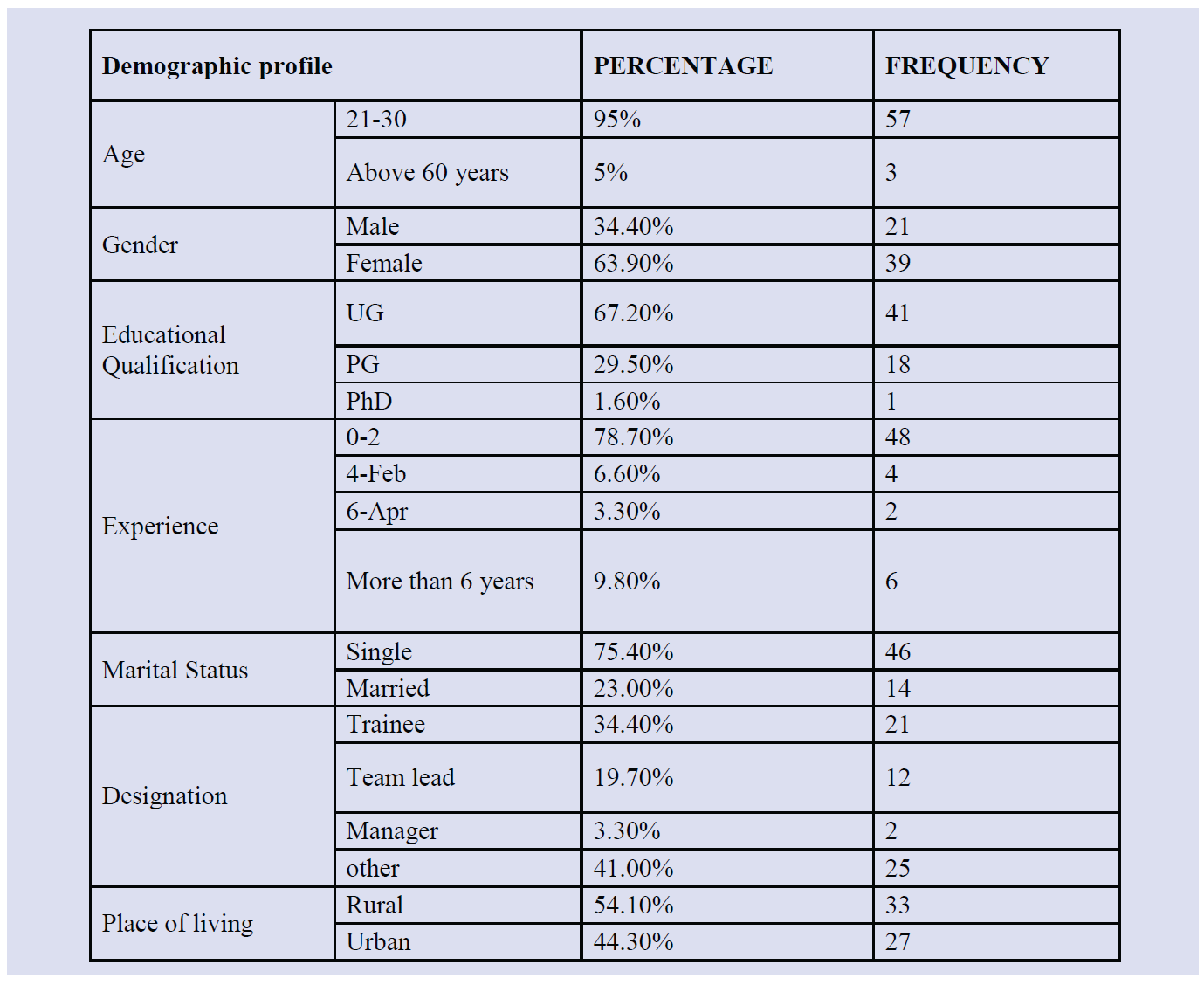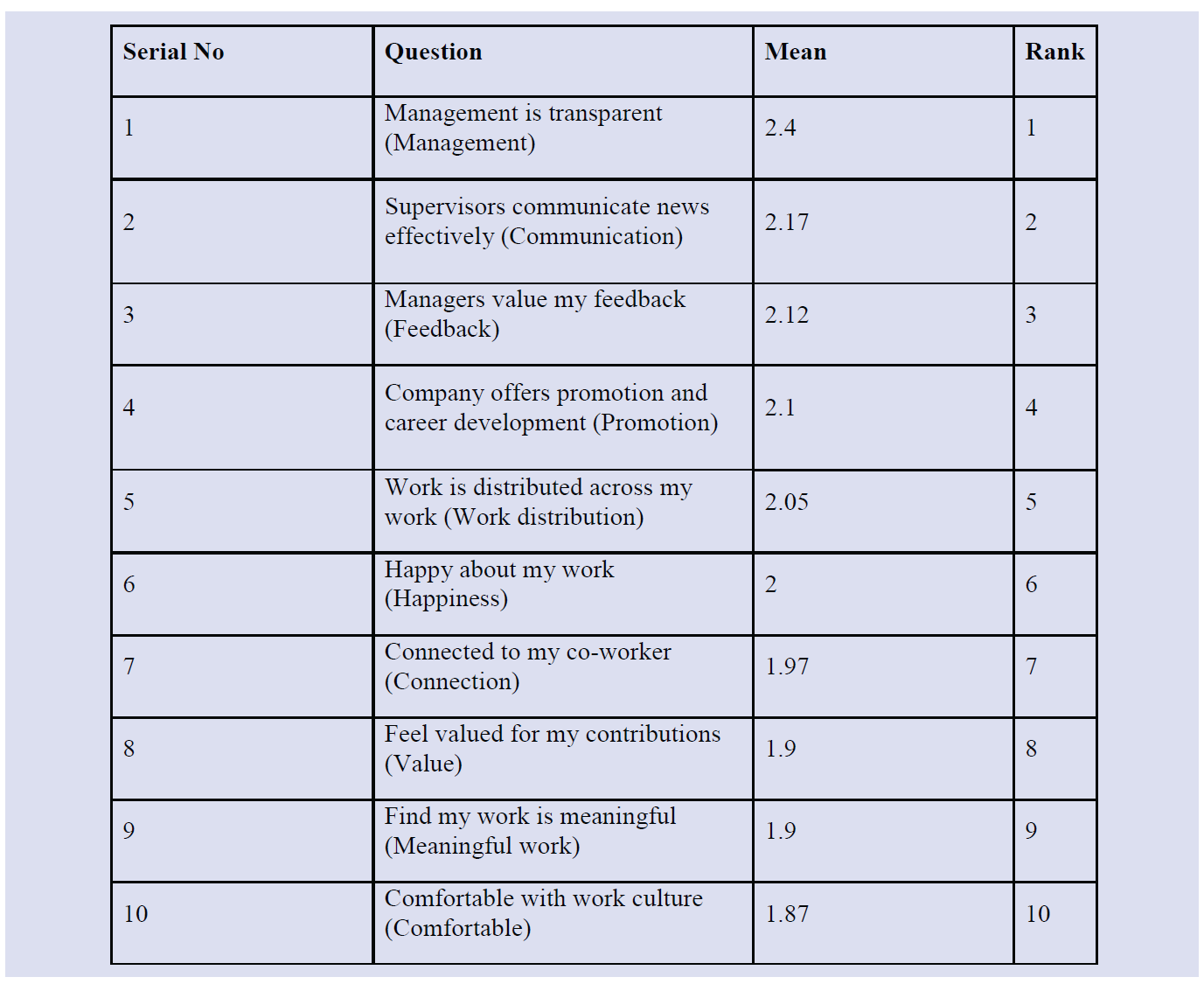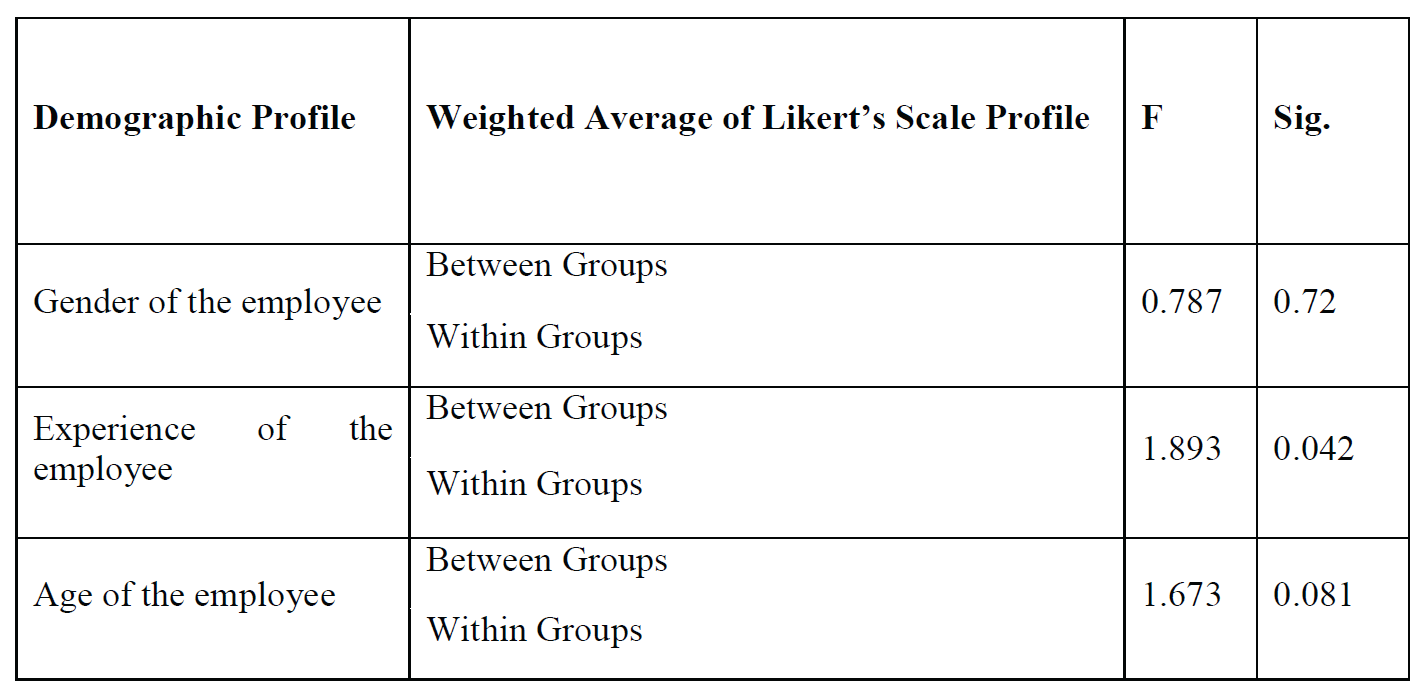ABSTRACT
This exploration intends to explain about “A Study On Employee Job Satisfaction In IT Sector. Job is the larger part of every human being so job satisfaction has some effect on the life of humans. Employment satisfaction refers to how content a person or employee is with their job. Three different paths explain job satisfaction of the employee: they are team work and its recognition, team lead support and employee work life balance. If the employee is satisfied with their job it leads to minimal error of their work and also it will in turn increase the quality of the product output thereby loyalty of the customers increases. Job satisfaction is not only based on the perks and benefits of the company, it is also about the appreciation for the work done by the employee. The study’s goal is to determine whether the workers are content with their jobs. Data was collected from a sample of 60 workers from an assiduity and the result is presented in the paper. In this article descriptive methodology has been used.
INTRODUCTION
Leadership is a technique through which a manager may lead, guide, and influence the efforts and activities of others toward completion of certain goals in a particular circumstance. The capacity to inspire subordinates to work with vigor and confidence is what is known as leadership. The purpose of this composition is to enable you to move to an advanced platform that will impact effectiveness and growth. But, when we come to a virtual team where the employees are working from different locations in this scenario, the companies manage to maintain a leadership to get the effectiveness of work from the employees.
Decision Making is a very big problem for the companies during the work you may successfully complete numerous phases of the decision-making process by using excellent decision-making approaches. Information is the very important thing to make a decision. In work from home sharing information about a work process is a little issue. To solve this problem, now they are using e-mail, calls, and daily standup calls to collect the information from the employees. The working culture of the employees gets different from working from office and working from home, in working from office the employees can communi-cation with the co-workers are high in office there can have a some funs with the co-workers. But at work from home, the communication between the workers is less. Some employees are getting stressed and depressed because of being alone at home. Work life Balance of employee is the leading concern in the public due to the increase in responsibility and commitments. It is a state of equilibrium in which the person’s job and the personal life are the same. In another word it is a push and pull between work and family commitments. It needs to be achieved by reducing the conflict among the balancing between multiple roles and tasks. It also includes employees who are not parents but have a desire for other activities like sports, study, etc. The intention of the learning is to spot the factors influencing employee job satisfaction.
REVIEW OF LITERATURE
Timothy A (2014), judge and two others have prepared an review paper on job satisfaction and they have discussed the history of job satisfaction and how the construct has been explicated and refined over time and they also described the various paradigms and approaches to the measurement of job satisfaction, at last they have suggested the practitioners to closely on the determinants on job satisfaction. Jitendra Kumar Singh (2013) has outlined the broad contours of various available that are responsible for employee satisfaction, and he also suggested the various ways to enhance and maximize the employee satisfaction. Muhammad Mahamuda Parvin (2011), has provided a thorough analysis of the pharma-ceutical industry’s work satisfaction indexes and the factors that causes the dissatisfaction and je also suggested few ways to improve them. M M. Nurul Kabir (2013), in his article have extended the role of gender using the gender theory on job satisfaction by portraying traditional values and he also assessed the structure of work and a nation’s dominant gender ideology by combining the shape of women and men’s job satisfaction and work experience in a transitional context. Ashok Panigrahi (2015), has conducted a survey to identify what is most Important to the employees and identify where the com-pany is lacking in building a healthy relationship with its employees. Neeraj Kumari (2008), has conducted a survey to measure the satisfaction level of the employee. He found that overall job satisfaction showed people were satisfied with their current job. He concluded that still some effective measures should be taken to improve the satisfaction level further. Dr.R.Perumal (2013), in his paper he intends to identify the different factors that affect job satisfaction in pharmaceutical companies. And he concluded that the Job satisfaction is related to different socio-economic and personal factors, such as: Age, sex Incentives, Working Environment, Education, duration of work etc. R.Satyavathi (2017), has found from his research that a company’s employee’s motivation plays a critical part in determining job satisfaction by inspiring them to work hard to achieve the aims and objectives of the firm. According to D.Subhashini’s (2016) findings, there is a favorable association between job satisfaction characteristics and employee performance at both the supervisory and worker levels employed in the automobile sector. According to Abdul Raziq (2015), this paper may help people improve personally and serve society by motivating them to give more to their work. In order to accomplish the business’s goals and objectives, it is crucial for an organisation to inspire its workforce to work hard. JAMES P. CAMBELL (1983). The findings imply that the global evaluation of overall job satisfaction on a scale of 1 to 5 may be a more comprehensive indicator of overall job satisfaction than the total of numerous aspect replies. According to Daniel S. Hamermesh (1999), job satisfaction is particularly responsive to unexpected increases in the returns to observable skills, less so to unexpected increases in the returns to unobservable skills, and the effects of unexpected increases in earnings on job satisfaction fade over time.
RESEARCH METHODOLOGY
Descriptive research design was used for this research. A structured questionnaire with 10 questions was circulated among the IT company employees and was asked to answer in 5 point Likert’s scale. Around 60 responses were recorded and the data were put to various tests such as frequency analysis, mean analysis and ANOVA.
DATA ANALYSIS AND INTERPRETATION:

It is inferred from the above table from 60 respondents, were the age group of 21-30years (95%) and above 60 years (5%). Gender statuses of respondents are Male (34.4%) and Female (63.9%). Considering the educational qualification are UG (67.2%), PG (29.5%)and PhD (1.6%).Experience of 0-2years (78.7%), 2-4 years (66.7%) 4-6 years (3.3%) and more than 6 years(9.8%). Based on the marital status for single it is observed that percentage rate (75.4%) and for married employees it is about (23.0%).From the designation of trainee (34.4%), team lead (19.7%), manager (3.3%) and other (41%) are observed. Finally, based on the place of living, rural (54.1%) and urban (44.3%) are observed.

From the table 2, it is inferred that the highest score includes Management of 2.40 followed by Communication (2.17), Feedback (2.12), Promotion (2.10), Work distribution (2.05), Happiness (2.00), Connection (1.97), Value (1.90), Meaningful work (1.90), Comfortable (1.87). All the mean scores lie between 1 to 2. It concludes the respondents are agreeing towards all the mentioned factors.

From the above table it is inferred that, there is a significance difference among the experience, age of the employee and weighted average of Likert’s Scale profile because its significance value is less than 0.05. Also that Since its significance value is more than 0.05, there is no statistically significant difference between the employee’s gender and the weighted average of their Likert scale profile.
Conclusion
The survey’s results and recommendations are based on them, and action should be made to further these recommendations for further growth. I get the conclusion that the job offers both the chance to use skill in the workplace and the satisfaction of a job well done from the study above. There are many employees who agree that there is occasionally a lot of freedom in coordinating with work and who are satisfied with the current regulations.
References
- Abuhasesh, M., & AL-Dmour, R. (2019). Factors that affect Employees job Satisfaction and Performance to Increase Customers Satisfaction. University of Jordan.
- Arnolds, & Boshoff, C. (2001). The challenge of motivating top management. A need for satisfaction. Journal of Industrial Psychology.
- Bakotic, D. (2013). Relationship between job satisfaction and organizational performance. Economic Research-Ekonomska Istraživanja, 118-130.
- D, S., & Shaju, M. (2016). A Study on the impact of Job Satisfaction on Job Performance of Employees Working in Automobile Industry, Punjab, India. Anna University.
- Ellickson.M.C, & Logsdon, K. (2002). Determinants of job satisfaction of municipal government employees. Public Personnel Management.
- Kumari, N. (2008). A study of improving satisfaction Level. The relationship to organizational commitment, perceived organizational support, transactional leadership,transformationalleadership,and level of education. Eur.J. Sci. Res, 286-295.
- Maslow, A. H. (1954). Motivation and personality. New York: Harper and Row.
- Mishra, P. K. (2013). Job Satisfaction. D.S.College, Gangtok, Sikkim,, 45-54.
- Parvin, M. M., & Kabir, M. M. (2011). Factors Affecting Employee Job Satisfaction of Pharmaceutical Sector. Agricultural University.
- Polities, J. D. (2001). The relationship of various Leadership styles to Knowledge Management. The Leadership and Organization Development.
- Raziq, A., & Maulabakhsh, R. (2015). Balochistam University of Information Technology Impact of Working Environment on Job Satisfaction. Balochistam University, 717-725.
- Satyavathi, R., & NagaBhavyaSree, R. (2017). Employee Job Satisfaction. Mallareddy Engineering College for Women, Secunderabad, India.
- Vyas, S. (2022). Job Satisfaction at the time of COVID-19: An investigation of information technology sector in India. Symbiosis International University.
- Wanous, J. P. (1972). Measurement and Meaning of Job Satisfaction . Journal of applied Psychology, 95-105.
DOI
https://doi.org/10.57259/GRJ4854
Research Objectives
Primary Objective
- To study the role of material purchasing and supply chain manage ment in Meythoma international company.
Secondary Objectives
- To study the role of material purchasing techniques followed.
- To measure the effectiveness of handling multiple suppliers for materials.
- To understand the importance of material quality while purchasing.
- To evaluate the best supplier by value analysis.
Bio

Dr,L.Anitha M.A,M.H.R.M, MBA, Ph.d, Asst. Professor Saveetha School of Management NSS Coordinator saveetha university city campus, 15 years experience, SIMATS

